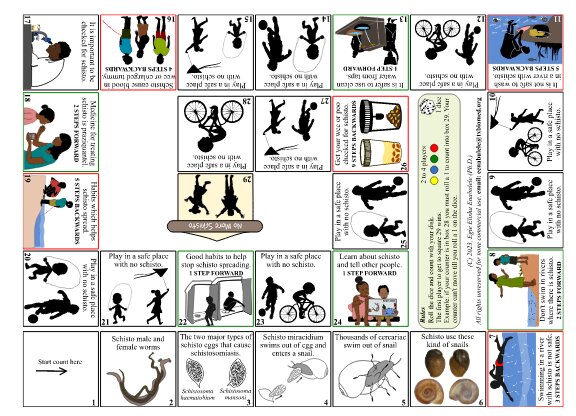Playing the way to No More Schisto
Health education plays a crucial role in raising awareness and promoting preventive measures against various diseases. When it comes to neglected tropical diseases (NTDs), such as schistosomiasis, there is a pressing need to reach populations in endemic areas, particularly school-aged children.
GSA colleague and member of our Behaviour Change and Health Education Working Group, Dr Egie E. Enabulele is a dedicated advocate and scientist, and has taken a creative approach by developing educational games to reduce the burden of schistosomiasis among children. He is a molecular parasitologist and children’s book author based at the Texas Biomedical Research Institute. He has conducted extensive research on the genomics of the causative agents of schistosomiasis, seeking to deepen the understanding of the disease and contribute to its prevention and control.
Dr Enabulele grew up in Nigeria, the most populous country in Africa, that is heavily burdened by both S. haematobium and S. mansoni. He witnessed firsthand the devastating impact of repeated schistosomiasis infection on children, including anaemia, stunted growth, enlarged liver and spleen, as well as damage to the kidneys, bladder, and genitals. The chronic and morbidly ill-health caused by schistosomiasis can have a hugely detrimental effect on children’s mental and physical development. His experiences motivated him to pursue a career in science and despite his demanding work in the laboratory, he remains passionate about simplifying scientific concepts and making them accessible to non-scientific audiences, especially children. He firmly believes that education is a key factor in reducing the prevalence of schistosomiasis and other NTDs.
No More Schisto
Dr Enabulele's commitment to health education led him to create the No More Schisto game, a creative and engaging board game designed to educate children about schistosomiasis. The game takes the player through the stages from schistosomiasis infection to treatment, via symptoms and diagnosis, and highlights the risky behaviours which perpetrate infection cycles. The game's primary objective is to increase awareness and knowledge while promoting behaviour change among school-aged children, who are most vulnerable to the disease.
The game's format, which can be printed on an A4-sized paper, ensures its practicality and suitability for field settings in schistosomiasis-endemic countries. His vision extends beyond the current version, as he aims to secure funding for larger prints to reach a wider audience.
The rules of the game are simple. Players roll a dice and move accordingly, following the instructions on each box they land on. The first player to reach box 29 is the winner. The game can be played by up to four children and can be completed within 15 minutes.
Through these interactions, children learn the life cycle of schistosomes, the journey from schistosomiasis infection to symptoms, diagnosis, and treatment; understand risky behaviours and how to avoid them. By combining education with entertainment, his game effectively engages children and encourages their active participation in learning about schistosomiasis.
Beyond the game
Dr Enabulele's efforts in health education and schistosomiasis prevention have not gone unnoticed. The ISNTD Festival 2023, an annual event that brings together experts and stakeholders in the field of NTDs, awarded him the 2023 ISNTD Festival Game Award for his outstanding contribution. In addition to developing the No More Schisto Game, Dr Enabulele has worked on various other behaviour change communication resources for NTDs, including the "Two Eggs Which Make You Sick: A Schistosomiasis Booklet for Children", and the Female Genital Schistosomiasis leaflet on the right.
Health education plays a pivotal role in raising awareness and promoting healthy behaviours, especially for neglected tropical diseases like schistosomiasis. Egie E. Enabulele's approach to health education through the No More Schisto game highlights the power of gamification in educating and empowering children. By simplifying scientific concepts and fostering behaviour change, health education games have the potential to reduce the prevalence of schistosomiasis and inspire similar initiatives for other NTDs.
